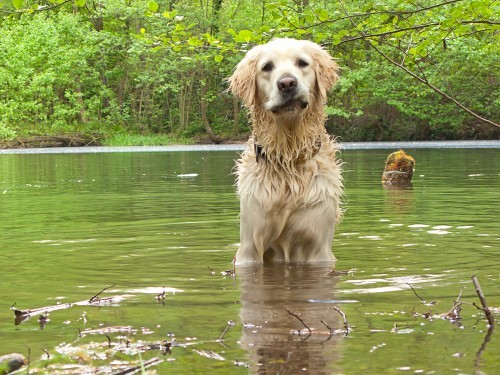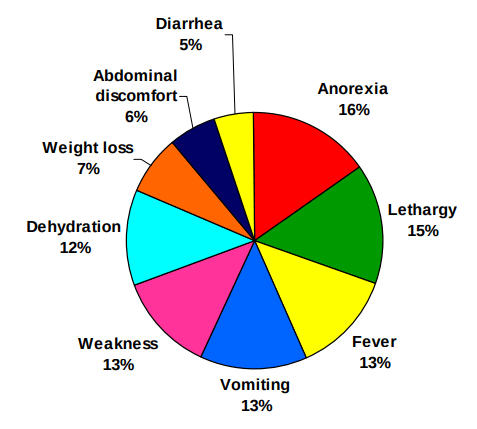Leptospirosis occasionally makes the news around Colorado and can generate a lot of questions and concerns. Because of that, we wanted to put together a quick overview of what leptospirosis is and what you need to know about it!
What Is Leptospirosis?
Leptospirosis (often referred to as simply “lepto”) is a bacteria that can infect the kidneys and vital organs of dogs, humans and other mammals. Because lepto can be transmitted from domestic or wild animals to humans lepto makes the local news more than many other animal diseases. The disease is present across Colorado and the Denver metro area, but the chances of contracting the disease from your dog are generally low.
How is Leptopsirosis spread?
Leptospirosis is spread through the urine of infected animals or through contaminated water. Households with multiple dogs, other pets or young children may be at more risk for the disease spreading. In addition, households where family members spend significant time with their dogs in wildlife areas (camping, hiking, etc) are at an increased risk.
If infected urine is directly ingested by another mammal there is a chance of infection. This can happen more often than you think! While dogs that have interactions with raccoons or other wildlife are most at risk, dogs can come in contact with the bacteria through interactions with mice or other small mammals that make it indoors.
However, the more common route of infection for humans and dogs comes from exposure to leptospirosis contaminated water. The lepto bacteria can stay active as long as its environment is moist. This means that bacteria in standing water, especially smaller pools of standing water like puddles, can be transmitted to dogs. I think we are all familiar with the look of happy surprise our dogs show when they find a puddle on a hot day. They seem convinced that the puddle was put there just for them!
Once an animal has been infected, the leptospirosis bacteria can cause a wide variety of symptoms which can make it difficult to spot. Some infected dogs don’t show any signs of illness. Others show mild symptoms that resolve on their own, and some dogs develop severe life-threatening illness.
Spotting Leptospirosis Symptoms In Dogs
Leptospirosis can cause a wide range symptoms that vary between species and individual dogs. According to a survey by the Colorado Veterinary Medical Association of 162 clinics in the state, the most common symptoms that lead to a diagnosis of lepto were anorexia and lethargy- but many other symptoms were also present.
Clinical Presentation Of Colorado Leptospirosis Cases
From Leptospirosis Incident Survey by the CVMA
Any of these conditions could be related to a variety of illnesses and as you can see from the chart above there is no single symptom that is linked to leptospirosis infections. This can make the process of diagnosis difficult for veterinarians and most often patient history is a huge factor in getting the correct diagnosis.
How Prevalent is Leptospirosis in Colorado Dogs?
The same survey by the CVMA asked veterinary clinics how many lepto cases they diagnosed and treated. Denver country clinics reported 42 diagnosed cases. Arapahoe and Adams County (which make up most of Aurora) animal clinics reported a total of 48 diagnosed cases for a total of 90 cases across the Denver/Aurora metro area.
Across the state, participating vet clinics reported a total of 265 diagnosed cases. That means that the 90 cases reported across Denver and Aurora represent 34% of the total reported cases across the state.
As just over 1/3 of all of the cases in the state have happened in more populated areas, this supports the idea that leptospirosis is becoming a more urban concern and that vaccination may be prudent even for pets that do not venture into heavy wildlife areas.
Our Aurora veterinary practice has seen several interesting cases of leptospirosis come from the surrounding urban areas. In all cases, the family members of the infected dogs were also put on antibiotics by their regular physicians, and several dogs required hospitalized care for multiple days to treat symptoms of liver and kidney failure. Most interesting, considering that our clinic abuts Cherry Creek State Park, is that the cases we have seen have not been avid dog park visitors or hiking/camping dogs. Instead, these were family pets who spent the entirety of their lives in their home or backyard.
We often catch leptospirosis through abnormal blood values (particularly those related to the liver and kidney) on lab work run on ill pets. Once we suspect leptospirosis, we can do an additional test to confirm this diagnosis.
Should I Vaccinate My Dog For Leptospirosis?
The Leptospirosis vaccine is not considered a core vaccine according to AAHA (American Animal Hospital Association) guidelines. At Parkside Animal Health Center, we discuss this vaccination as part of our lifestyle-dependent recommendations. We discuss with owners the cases we have seen around Aurora and find out if the dog is likely to come into contact with urban wildlife (raccoon, squirrel, fox or coyote), or if they frequent more rural areas (hunting, hiking, and camping). In addition, we discuss the requirements for their regular boarding and grooming facilities, as some of these are beginning to require proof of leptospirosis vaccination to protect their animal care staff from infection.
Vaccinations for leptospirosis are not all equal – there are several types of common leptospirosis bacteria (called serovars), and vaccination for one is not protective against the others. Therefore, the most appropriate vaccines are those that contain the 4 most common serovars (canicola, icterohaemorrhagiae, grippotyphosa, and pomona). The initial vaccination must be boosted in 2-4 weeks in order to be protective for a full year, and this vaccination must be boosted annually while the dog is at risk for infection.
As with every vaccine, reactions and allergies are possible, and most commonly include discomfort at the injection site or mild lethargy. These symptoms typically resolve on their own. However, we do like to prevent over-vaccination at any given appointment, and if your dog also needs other vaccinations we may work with you to set up a separate technician appointment in a couple of weeks for the purpose of leptospirosis vaccination. This typically only takes about 5 minutes and the only charge is for the vaccine itself.
Managing Leptospirosis Risk
Before making a final decision for or against lepto vaccination, discuss your dog’s lifestyle with our clinic team. The best veterinary medicine is catered to the individual canine and through a conversation with one of our veterinarians you can find out more about the risk factors in your area and the best ways to manage those risks. Leptospirosis is a real issue in Colorado and is being diagnosed more frequently in urban areas, but with education and prevention the risk can be greatly reduced.


